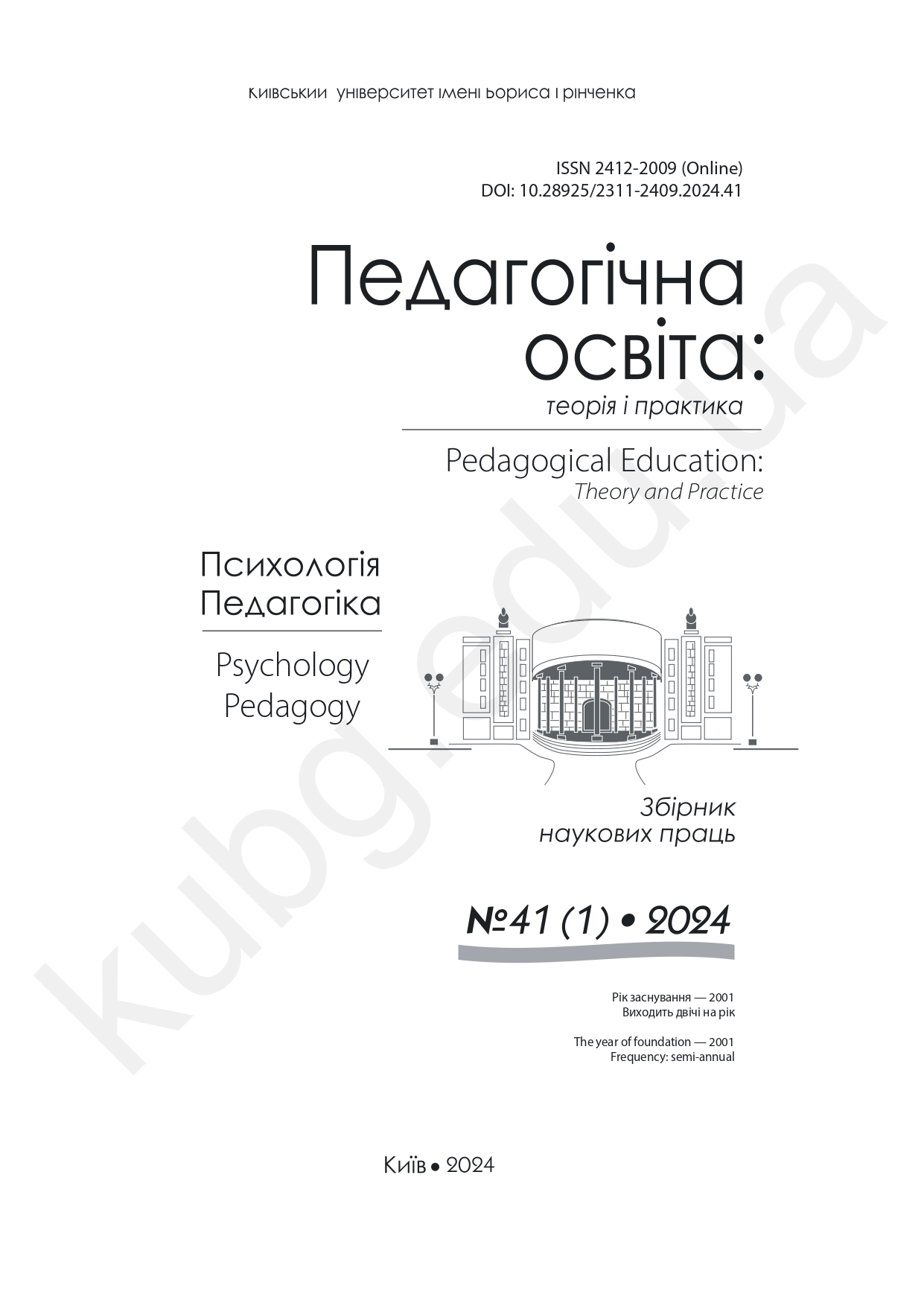The ecosystem approach as a methodological reference point for the innovative development of higher pedagogical education
DOI:
https://doi.org/10.28925/2311-2409.2024.413Abstract
The article presents a theoretical analysis of the ecosystem approach as a methodological basis
for innovative transformations in higher pedagogical education. The essence of the ecosystem approach
in education is to direct the researcher to a systematic vision of the relationships and processes necessary
to maintain ecological (healthy, sustainable, productive, diverse, coordinated) human relationships within
and outside the educational system, its integrity, elements and structures, functions, values and qualitative
parameters of life through self-regulated management, protection and preservation of educational ecosystems
over time. The author of the article analyzes the scientific thesaurus of the problem, the essence and origins
of the ecosystem approach, its conceptual basis and basic axioms, the main aspects, basic principles and ways
of implementing the ecosystem approach in higher education. Particular attention is paid to educational
ecosystems as a key driver of innovative development of higher pedagogical education. In particular, the
article examines the nature, features, characteristics and basic approaches to the development of educational
ecosystems (ecosystem as belonging and ecosystem as structure), considers the peculiarities of their formation
and development depending on the structure. A scientific thesaurus of the problem of developing an ecosystem
of higher pedagogical education is presented. It is represented by such concepts as: «ecosystem approach»,
«ecosystem structure», «ecosystem actors», «ecosystem constellation», «ecosystem life cycle». The stages
of development of educational ecosystems are summarized and the advantages of implementing the ideas of the
ecosystem approach in a modern university (improving the efficiency of the educational process, increasing the
accessibility of education, improving the quality of education) are considered. The materials of the article can be
used to develop effective tools for the support and innovative development of educational ecosystems in higher
education institutions
Downloads
References
Антошина І.В. Методологія як фундаментальна основа наукового дослідження. Академічні візії.
Режим доступу: https://academy-vision.org/index.php/av/article/view/957
Гончаренко С. Методологія. Енциклопедія освіти. 2008. С.498 — 500.
Гриценко М.В. Егалітарна та елітарна освіта в контексті становлення нового університету.
Вища освіта України: теоретичний та науково-методичний часопис. Тематичний випуск «Європейська інтеграція вищої освіти України в контексті Болонського процесу». 2013.Режим доступу:
Завгородня Т.К., Стражнікова І.В. Методологічні засади педагогічних досліджень: навчально-методичний посібник. Івано-Франківськ, 2021. Режим доступу: http://surl.li/cbqzr
Леонтьєва І.В. До проблеми розбудови екосистеми вищої педагогічної освіти. Педагогічна освіта: Теорія і практика. Психологія. Педагогіка. 2023. №40 (2). Режим доступу: https://doi.
org/10.28925/2311-2409.2023.403
Леонтьєва І.В. Концептуальні засади екосистеми сучасної педагогічної освіти. Педагогічна освіта:
Теорія і практика. Психологія. Педагогіка. 2023. 39 (1). Режим доступу: https://doi.org/10.28925/2311–
2023.393
Методологія як важливий складник наукового дослідження в педагогіці / Семен Гончаренко, Василь Кушнір // Неперерв. проф. освіта: теорія і практика. 2002. 4. С. 15–22.
Сисоєва С.О. Методологія науково-педагогічних досліджень: Підручник / С. О. Сисоєва, Т. Є. Кристопчук. Рівне : Волинські обереги, 2013. 360 с.
Сігов К. Ідея Університету і могилянський палімпсест. Той, хто відродив Могилянку : зб. до 60-ліття В’ячеслава Брюховецького. 2007. https://ekmair.ukma.edu.ua/server/api/core/bitstreams/93ca0db0-
-4d94-9fd8-7eb166ba73c3/content
Cascio J. BANI: Facing the Age of Chaos. 2020. https://medium.com/@cascio/facing-the-age-of-chaosb00687b1f51d
Antoshina, I. V. (2024). Metodolohiia yak fundamentalna osnova naukovoho doslidzhennia
[Methodology as a fundamental basis for scientific research]. Akademychni vizii. (in Ukrainian) https://
academy-vision.org/index.php/av/article/view/957
Honcharenko, S. (2008). Metodolohiia [Methodology]. Entsyklopediia osvity. Р. 498–500. (in Ukrainian)
Hrytsenko, M. V. (2013). Ehalitarna ta elitarna osvita v konteksti stanovlennia novoho universytetu
[Egalitarian and elitist education in the context of the formation of a new university]. Vis’cha osvita Ukrainy:
teoretichnyi ta naukovo-metodychnyi chasopys. Tematychnyi vypusk «Yevropeys’ka integraciya vys’choyi
osvity Ukrainy v konteksti Bolons’koho protsesu» (in Ukrainian) http://surl.li/susgo
Zavhorodnya, T. K., & Strazhnikova, I. V. (2021). Metodolohichni zasady pedahohichnykh doslidzhen:
navchalno-metodychnyi posibnyk [Methodological foundations of pedagogical research]. Ivano-Frankivsk.
(in Ukrainian) http://surl.li/cbqzr
Leontyeva, I. V. (2023). Do problemy rozbudovy ekosystemy vys’choyi pedahohichnoyi osvity [On the
problem of developing an ecosystem of higher pedagogical education]. Pedahohichna osvita: Teoriya
i praktyka. Psykholohiya. Pedahohika, 2023(40), 2. (in Ukrainian) https://doi.org/10.28925/2311-
2023.403
Leontyeva, I. V. (2023). Kontseptual’ni zasady ekosystemy suchasnoyi pedahohichnoyi osvity [Conceptual
Foundations of the Ecosystem of Modern Teacher Education]. Pedahohichna osvita: Teoriya i praktyka.
Psykholohiya. Pedahohika, 2023(39), 1. (in Ukrainian) https://doi.org/10.28925/2311–2409.2023.393
Honcharenko, S., & Kushnir, V. (2002). Metodolohiia yak vazhlyvyi skladnyk naukovoho doslidzhennia
v pedahohitsi [Methodology as an important component of scientific research in pedagogy]. Neperervna
profesiina osvita: teoriia i praktyka. № 4, Р. 15–22. (in Ukrainian)
Sysoeva, S. O., & Krystopchuk, T. E. (2013). Metodologiya naukovo-pedagogicheskikh issledovaniy:
Pіdruchnik [Methodology of scientific and pedagogical research]. Rivne: Volins’ki oberegi. (in Ukrainian)
Sygov, K. (2007). Ideia Universytetu i mohylianskyi palimpsest. Toi, khto vidrodyv Mohylianku [The idea
of the University and the Mohyla Palimpsest. The one who revived Mohyla]. zbirnyk do 60-littia Viacheslava
Briukhovetskoho. 2007. (in Ukrainian) https://ekmair.ukma.edu.ua/server/api/core/bitstreams/93ca0db0-
-4d94-9fd8-7eb166ba73c3/content
Cascio, J. (2020). BANI: Facing the Age of Chaos. https://medium.com/@cascio/facing-the-age-ofchaos-b00687b1f51d

